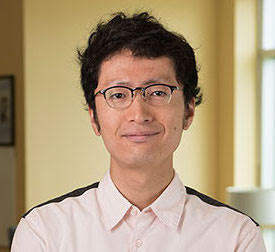
Takuya Tsunoda
Assistant Professor of Japanese Film and Media
Office: 416 Kent Hall
Office Hours: On leave for spring 2022
Phone: (212) 854-5040
Email: tt2101@columbia.edu
Educational Background
BA: Waseda University (’02), Columbia University (’05)
MA: Columbia University (’08)
PhD: Yale University (’15)
Classes Taught
EAAS UN3322 East Asian Cinema
EAAS UN3343 Japanese Contemporary Cinema and Media Culture
EAAS GU4122 Japanese New Wave and Cinematic Modernism
EAAS GU4123 Japanese Documentary Films
EAAS GR6400 Critical Approaches to East Asian Studies: Literary and Cultural Theory
EAAS GR8070 Graduate Seminar in Japanese Cinema and Visual Culture
Research Interests
Japanese cinema and media, educational and science film, industrial cinema, history and theory of audio-visual pedagogy, media archaeology, cinematic modernism, new cinemas of the 1960s, television
Takuya Tsunoda’s primary research centers on the interplay between institutions and media, technologies and socio-cultural practices, science and material culture, and representation and knowledge formations. He is currently at work on a book project about Iwanami Productions, which evolved from a major provider of sponsored educational, science and public relations films into a key player in the new cinemas of the 1960s in Japan. Grounding his research in archival materials, he highlights the historical and theoretical intersection between media-based governmental and civic activities, cross-medial articulation of postwar academicism in Japan, and a postwar struggle over the legacy and meaning of cinematic modernism. Looking beyond the activist logic of political radicalism, his book argues that the crucial root of new cinemas in Japan resided in institutionalized audio-visual pedagogy and image-making practice. This project works towards new transnational parameters that relate the cinematic New Wave to a range of epistemic transformations and changing mediascapes occurring in the period. His recent research interests extend to such topics as various modes of reflexivity, children and media, the emergence of alpine photography and insect ecology, television documentaries as well as the relationship between diegesis and contemporary media cultures.
Prior to joining the Columbia faculty, he taught at Colgate University and the University of Chicago.
Selected Publications
“Index and Deixis: Jinba Isao and Polluted Water Karte,” in Images of Postwar Japan: Pollution, Youth Rebellion, and the Osaka Exhibition (Univ. of Tokyo, 2018, in Japanese)

 Ying Qian
Ying Qian
